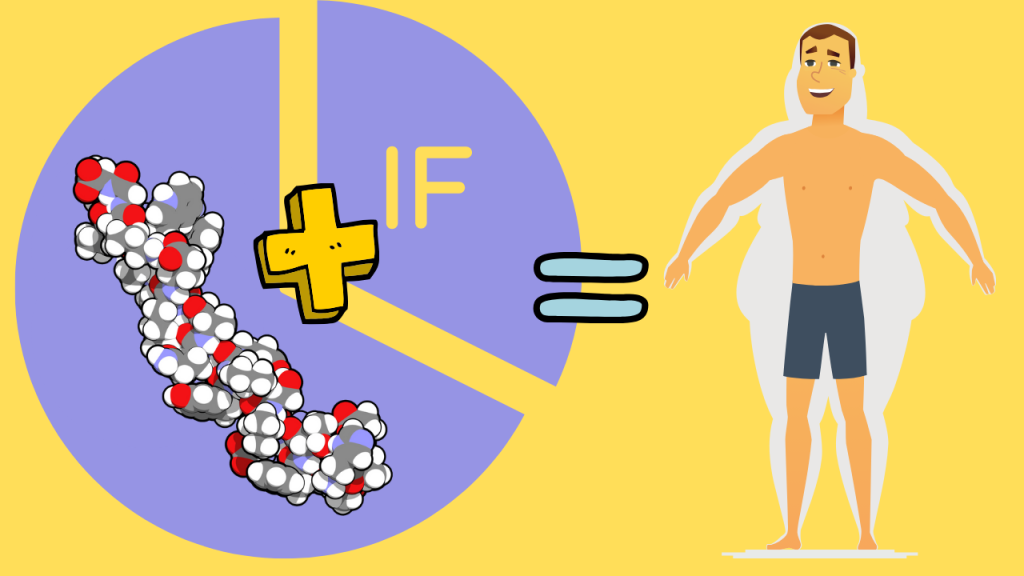Last updated on August 18th, 2025 at 08:12 am
► Table of Contents
In today’s age of health and wellness, approaches to weight loss and metabolic health are constantly evolving. Two significant methods that have garnered attention in recent years are the use of semaglutide, a medication approved for diabetes but showing promising results in weight loss, and intermittent fasting, a dietary practice that limits eating to specific windows of time.
For health enthusiasts, diabetics, and individuals looking to improve their nutrition and wellbeing, understanding the potential benefits and considerations of these methods is paramount.
In this extensive guide, we will explore how semaglutide and intermittent fasting work, their independent and combined effects on weight loss and metabolic health, potential side effects, and the role of healthcare professionals in managing weight-related strategies.
We will also analyze the existing evidence in support of each method and cite credible sources to support our findings. Whether you are on a weight loss journey, striving for better health, or looking to deepen your understanding of these topics, this blog post will equip you with the knowledge you need.
Recommended Articles 👇
👉 The Hidden Vitamin and Mineral Gaps That Might Be Blocking Your Weight Loss
👉 You Have This Resistance; That’s Why You’re Not Losing Weight.
Understanding Semaglutide

Semaglutide belongs to a class of medications known as glucagon-like peptide-1 (GLP-1) receptor agonists, originally developed for the treatment of type 2 diabetes.
It works by mimicking the effects of a naturally occurring hormone in your body that helps to regulate blood sugar levels and insulin secretion.
When semaglutide is administered, it can lead to increased insulin sensitivity, lower blood sugar, and a decrease in appetite, which can be beneficial for individuals looking to manage their weight.
How Does Semaglutide Work?
Semaglutide works through the GLP-1 receptors in the pancreas, slowing gastric emptying, reducing food intake, increasing insulin secretion, and lowering glucagon secretion which all work together to regulate blood sugar levels and promote weight loss. By activating these receptors, it enhances satiety, leading to a decrease in food consumption and caloric intake. (1)
Myths and Facts About Semaglutide
With any emerging medication or treatment, there are bound to be myths that can overshadow the facts. It’s important for individuals to discern the veracity of these claims, especially when it comes to semaglutide and its role in weight management.
Common Misconceptions About Semaglutide
Some misconceptions include the idea that semaglutide is only for diabetics or that it poses a significant risk to individuals due to its association with diabetes medications. People may also believe that it has a low success rate in achieving significant weight loss. (2)
The Truth About Semaglutide
The truth, backed by clinical evidence, is that semaglutide can be highly effective for weight loss—not just for diabetics but also for those without diabetes.
It is also safe when used as prescribed and under medical supervision. Clinical trials have shown that participants who used semaglutide experienced a more than 15% body weight loss over 68 weeks, which is substantial. (3)
Semaglutide for Weight Loss
The primary focus of numerous studies is the role of semaglutide in achieving significant weight loss. The data is clear that it can be a powerful tool for managing body weight.
The Role of Semaglutide in Weight Loss
Semaglutide works by reducing hunger and food cravings, leading to a reduction in the number of calories consumed. It also regulates blood sugar levels, boosting the metabolic processes involved in fat breakdown and weight loss.
Studies Supporting Semaglutide for Weight Loss
Landmark studies such as the STEP clinical trials have demonstrated the effectiveness of semaglutide in promoting weight loss when compared to a placebo. It has been found to reduce body weight by up to 14.9% in adults with obesity, showing clear benefits for overweight individuals seeking to lose weight. (4)

Understanding Intermittent Fasting

Intermittent fasting is an eating pattern that cycles between periods of eating and fasting. It does not specify which foods you should eat but rather when you should eat them. There are various methods of intermittent fasting, each with its own times of eating and fasting.
Different Types of Intermittent Fasting
Some of the most well-known methods include the 16/8 method, fast for 16 hours every day and eat within an 8-hour window, the 5:2 method, where you eat regularly for 5 days and severely restrict caloric intake for the remaining 2, the warrior diet, where you fast for 20 hours and consume one large meal in the evening, and alternate day fasting, where you alternate between days of regular eating and fasting.
Benefits of Intermittent Fasting
There is a plethora of health benefits attributed to intermittent fasting, ranging from weight loss to improved metabolic health. (5)
Beyond weight management, intermittent fasting has been associated with a myriad of potential health benefits. Studies suggest that it may enhance insulin sensitivity, lowering the risk of type 2 diabetes. (6)
Additionally, intermittent fasting has shown promise in reducing inflammation levels in the body, which could potentially lower the risk of chronic diseases. (7)
Moreover, it’s been linked to improved brain health by supporting cognitive function and reducing the risk of neurodegenerative conditions. (8)
Some research even indicates possible cardiovascular benefits, such as improved heart health and reduced risk of heart disease. (9)
Effectiveness of Intermittent Fasting for Weight Loss
Numerous studies have demonstrated the efficacy of intermittent fasting for weight loss, with participants often experiencing a significant decrease in body weight and fat mass.

Semaglutide vs. Intermittent Fasting

How do these two weight loss strategies compare? Understanding their differences and similarities can help individuals make informed decisions about their weight management approach.
Comparing the Effectiveness of Semaglutide and Intermittent Fasting
While both methods have been proven effective, semaglutide appears to yield more rapid and significant weight loss in clinical trials. The results are well-documented, with participants losing more weight compared to those who practiced intermittent fasting.
Pros and Cons of Each Method
Semaglutide offers a medicalized approach to weight loss, which can provide more structured support, especially for individuals with significant health-related weight concerns.
On the other hand, intermittent fasting may provide a more flexible and lifestyle-friendly approach to weight management, particularly for those who prefer dietary changes over medications.
Combining Semaglutide and Intermittent Fasting
Is there value in considering the combination of these two approaches, or could they potentially have conflicting effects on the body’s metabolic processes?
Semaglutide, a medication known for its role in weight management, and intermittent fasting, a dietary practice focused on regulating eating patterns, may complement each other effectively.
Both approaches share the common goal of reducing caloric intake and controlling appetite. When used in conjunction, they have the potential to synergistically enhance weight loss outcomes, offering a comprehensive approach to managing body weight.
Potential Benefits of Combining Both Methods
When used in tandem, the appetite-suppressing and metabolic-regulating properties of semaglutide could complement the fasting periods by making them more manageable, potentially leading to more substantial weight loss.
However, it is important to note that combining any two weight loss strategies should be done under medical supervision.

Studies on Semaglutide and Intermittent Fasting
What does the research say about the combined effects of semaglutide and intermittent fasting? Insight into these findings can offer a more definitive perspective on their synergy.
Review of Studies on the Combination of Semaglutide and Intermittent Fasting
While there may not be specific studies on the simultaneous use of semaglutide and intermittent fasting, there is existing clinical evidence that supports the concurrent use of appetite-controlling medications with fasting protocols.
Results and Conclusions from the Studies
Preliminary data suggests that pairing appetite-suppressants with intermittent fasting can lead to improved weight loss outcomes. However, more research into the safety and efficacy of these combinations is needed to provide conclusive recommendations.
Potential Side Effects of Semaglutide and Intermittent Fasting
No weight loss strategy is without potential side effects. It is crucial to understand the risks associated with both semaglutide and intermittent fasting before incorporating them into your health regimen.
Possible Side Effects of Semaglutide
Common side effects of semaglutide may include nausea, vomiting, diarrhea, constipation, and abdominal pain. Additionally, some individuals may experience mild gastrointestinal discomfort such as bloating or gas.
It is important to note that there is a potential risk of severe abdominal pain, which could be an indication of pancreatitis, a serious condition that requires immediate medical attention.
Potential Side Effects of Intermittent Fasting
Intermittent fasting can lead to irritability, hunger, difficulty concentrating, and inadequate nutrient intake if not properly planned.
Here is the list of all the potential side effects that you might experience while fasting:
- Excessive keto fatigue
- Nausea and headaches due to low blood sugar
- Feeling weak
- Persistent dizziness
- Having a slow thyroid
- Hair loss due to a lack of nutrients
- Kidney Stone
- Keto Flu and Cold
- Diarrhea
- Sleep disturbances such as nightmares and insomnia
- Experiencing brain fog
- High cholesterol
- Gout
To know more about the solution to these potential side effects, you can read our blog post below.
Consulting with a Healthcare Professional

The role of a healthcare professional in managing your weight loss efforts cannot be overstated. They are instrumental in providing guidance, monitoring for side effects, and ensuring you are on the right path to your health goals.
Importance of Consulting with a Healthcare Professional
Before starting any weight loss program, speaking with a healthcare provider is essential. They can evaluate your health status, discuss the most suitable approach for you, and make necessary adjustments to your plan.
Role of a Healthcare Professional in Managing Weight Loss
A healthcare professional can help set realistic weight loss goals, create personalized plans, track progress, and address any concerns or challenges along the way.

Conclusion
The tandem of semaglutide and intermittent fasting presents an intriguing prospect for those looking to enhance their weight loss and metabolic health journeys. Both methods, when used appropriately and under supervision, have the potential to offer significant health benefits.
While semaglutide provides a more medicalized approach with proven results in clinical trials, intermittent fasting brings a flexible dietary protocol that can be tailored to an individual’s lifestyle.
By understanding their effects, combining them, and seeking professional guidance, one can pave the way towards a healthier and more fulfilling life.
In conclusion, the quest for improved weight management and metabolic health is a multifaceted endeavor. By staying informed, utilizing the right tools, and engaging with healthcare professionals, individuals can find meaningful success in their pursuit of wellness.
Remember, achieving and maintaining a healthy weight is a long-term commitment, and the best regimen is one that aligns with your personal needs and fosters a sustainable lifestyle.

FAQ
Should I fast while taking semaglutide?
Yes, you can fast while taking semaglutide. Combining intermittent fasting with semaglutide can amplify weight loss effects. However, it’s crucial to approach this combination under medical guidance to ensure it suits your health needs and to adjust your semaglutide dosage if necessary.
How to speed up weight loss on semaglutide?
To accelerate weight loss while on semaglutide, consider integrating a balanced diet and regular physical activity into your routine. Focus on nutrient-dense foods, reduce sugar and processed foods, and increase your movement throughout the day. Consulting with a healthcare professional can provide personalized advice to maximize your results.
Does semaglutide put you into ketosis?
Semaglutide itself does not induce ketosis. Ketosis is a metabolic state achieved through significantly reduced carbohydrate intake, not directly through semaglutide. However, some individuals on semaglutide may adopt a low-carb diet as part of their weight management strategy, potentially leading to ketosis.
What happens if you Eat fast food on semaglutide?
Eating fast food while on semaglutide can counteract your weight loss efforts. Semaglutide works by regulating your appetite and blood sugar levels, but consuming high-calorie, high-sugar, and high-fat meals like fast food can lead to weight gain and decreased medication efficacy. It’s best to opt for healthier food choices to support your weight loss goals.
Related Articles
- Do Electrolytes Break a Fast? All Things You Need To Know
- Do BCAAs Break a Fast? A Nutritionist Explains
- 72 VS 96 Hour Fast: Is It Safe For You?
- 48 vs 72 Hour Fast: Which Is Better For You?
- 15 Best Intermittent Fasting Books
- Does Creatine Break a Fast?
- Does Pre Workout Break a Fast?
- Does Celsius Break a Fast? Exploring the Impact on Intermittent Fasting
- Do Pre Workouts Have Calories?
- circadian rhythm fasting
- The Stages of Fasting: What to Expect
- Dirty Fasting
- Fasting Mimicking Diet (FMD Diet): What Is It? Does It Work?
- Fasting for 48 hours: How-To, Benefits, and Downsides
- 7 Best Protein Shake for Intermittent Fasting: A Comprehensive Guide
- Does a Protein Shake Break a Fast? Debunking Myths and Understanding the Science
- 45 Best Electrolyte Powder for Fasting
- 13 Best Apple Cider Vinegar for Fasting
- Unveiling the 5 Best MCT Oil for Intermittent Fasting: A Comprehensive Review
- Does Chamomile Tea Break A Fast? The Shocking Truth
- 8 Best Tea for Fasting: A Comprehensive Guide for Tea Lovers
- The Ultimate Guide to Mastering Intermittent Fasting and Carb Cycling
- The Ultimate Guide to 15/9 Intermittent Fasting for a Healthier You
- Can I drink tea with artificial sweetener during intermittent fasting?
- Does Apple Cider Vinegar Break a Fast? The Ultimate Guide for Health Enthusiasts and Intermittent Fasters
- Does MCT Oil Break a Fast? The Quarter Pounder of Fasting Fuel
- Intermittent Fasting: The Ultimate Guide
- Can You Chew Gum While Fasting: The Sticky Truth
- 16 Best Coffee Creamer for Intermittent Fasting
- Does C4 Pre Workout Break Intermittent Fasting? The Shocking truth
- 5 Best Pre Workout for Intermittent Fasting: The Ultimate Guide
- Intermittent Fasting for Women Over 50: A Definitive Guide
- Fat Fasting: Is It for Fat Only?
- Eat stop Eat: The Secret of Brad Pilon
- 22/2 Intermittent Fasting: Are You Strong Enough For This?
- 20/4 Intermittent Fasting: Don’t Try this Unless…
- 18/6 Intermittent Fasting: The Secret Of Keto Practitioners
- 16 Potential Intermittent Fasting Side Effects And Their Solution
- 14/10 Intermittent Fasting: Why Is It Not For You?
- Dry Fasting: How Does It Make You Lose Weight
- THE MOST IMPORTANT BENEFIT OF AUTOPHAGY WILL SURPRISE YOU
- Surprising 20+ Benefits Of Eating One Meal A Day
- Acceptable Liquids During Intermittent Fasting: No. 7 Is Surprising
- IN INTERMITTENT FASTING CAN I EAT FRUITS?
- OMAD – One Meal A Day Diet: The Unspoken Truth
- Alternate-Day Fasting: Is It A Waste Of Time?
- 5:2 Diet: What is it And Does It Work?
- 16/8 Intermittent Fasting : Everything You Need To Know
- Food Fasting : All Things You Need To Know
- The Ultimate Diet Guide: Strategies for Effective Weight Loss
Ali Webster is a seasoned researcher, communicator, and Registered Dietitian with a diverse background encompassing government, nonprofits, academia, and health care. The core belief is that science should be made accessible, understandable, and relevant to all individuals, driving the motivation behind their work. Proficient in conducting and interpreting research to shape nutrition policy decisions, the individual also excels in nutrition and health communication, consumer research survey development and implementation, and clinical nutrition. Holding a Doctorate of Philosophy with a focus on Nutrition and Epidemiology from the University of Minnesota, their dietetic internship emphasized medical nutrition therapy.



